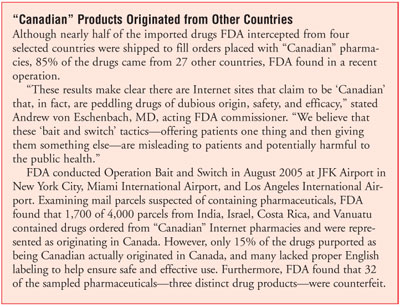US
Pharm. 2006;1:26.
Marketers of Bogus Avian
Flu Therapies Reprimanded
FDA has issued
warning letters to nine companies marketing products with claims of
effectively preventing avian influenza or other flu strains. The agency did
not find evidence of safety or efficacy of these products and expressed
concern that the therapies could harm consumers or interfere with conventional
treatments.
Of the nine companies that
received FDA warning letters, eight marketed dietary supplements with claims
of preventing, killing, treating, or shielding against avian flu. The
companies also stated that their products were natural or safer than approved
treatments or preventive medical products.
In its warning letters, FDA
stated that the firms needed FDA approval for their products before marketing
them, as the agency considered the products drugs due to the manufacturers'
claims.

Barley Products Can Carry Health
Claim
Whole-grain barley
and barley-containing products can carry claims that they reduce the risk of
coronary heart disease (CHD), according to a recent FDA announcement.
The health claim may appear on
whole-barley and dry milled barley products such as flakes, grits, flour, and
barley meal. An example of the claim is "Soluble fiber from foods such as
[name of food], as part of a diet low in saturated fat and cholesterol, may
reduce the risk of heart disease. A serving of [name of food] supplies [x
] grams of the soluble fiber necessary per day to have this effect."
Food manufacturers may
immediately use the health claim regarding barley and the reduced risk of CHD
through the issuance of an interim final rule. To qualify for the claim,
barley-containing foods must provide at least 0.75 g of soluble fiber per
serving.
Condom Guidance Issued
New recommendations
for labeling of latex male condoms are available in draft guidance prepared by
FDA's Center for Devices and Radiological Health. The recommendations are not
binding unless they are published as a final rule.
Regarding the risk of
unintended pregnancy associated with condom use, FDA proposes that
manufacturers specify on condom packaging that condoms reduce--but do not
eliminate--the risk of pregnancy and include a table comparing pregnancy rates
associated with barrier contraceptives. FDA urges the inclusion of statements
on risks of transmission of HIV/AIDS and other sexually transmitted diseases
(STD) associated with condoms.
FDA also proposed labeling for
condoms with lubricant containing nonoxynol-9 (N-9). Although N-9 kills sperm,
the agency does not know the extent of pregnancy protection contributed by the
spermicide. Furthermore, FDA advises condom manufacturers to include labeling
stating that N-9 does not protect against HIV/AIDS or other STDs and that it
can irritate the vagina or anus, leading to increased risk of HIV/AIDS.
--Abigail Brugger
To comment on this article, contact editor@uspharmacist.com.






